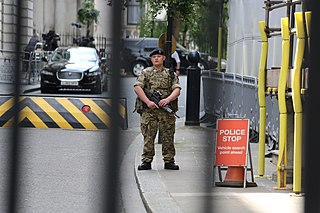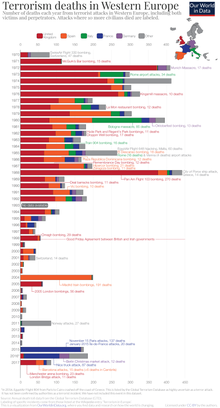
Al-Qaeda is a pan-Islamist militant organization led by Sunni Jihadists who self-identify as a vanguard spearheading a global Islamist revolution to unite the Muslim world under a supra-national Islamic caliphate. Its membership is mostly composed of Arabs, but also includes people from other ethnic groups. Al-Qaeda has mounted attacks on civilian, economic and military targets of the US and its allies; such as the 1998 US embassy bombings, the USS Cole bombing and the September 11 attacks. The organization is designated as a terrorist group by NATO, the UN Security Council, the European Union, and various countries around the world.

The Terrorism Act 2000 is the first of a number of general Terrorism Acts passed by the Parliament of the United Kingdom. It superseded and repealed the Prevention of Terrorism Act 1989 and the Northern Ireland Act 1996. It also replaced parts of the Criminal Justice Act 1998. The powers it provides the police have been controversial, leading to noted cases of alleged abuse, and to legal challenges in British and European courts. The stop-and-search powers under section 44 of the Act have been ruled illegal by the European Court of Human Rights.

Ansar al-Islam in Kurdistan, simply called Ansar al-Islam, is a Kurdish Islamist militant and separatist group. It was established in northern Iraq around the Kurdistan Region by Kurdish Islamists who were former Taliban and former Al-Qaeda volunteers, which were coming back from Afghanistan in 2001 after the Fall of Kabul. Its motive is to establish an Islamic state around the Kurdistan region and to protect Kurdish people from other armed insurgent groups. It imposed strict Sharia in villages it controlled around Byara near the Iranian border.
Islamic terrorism refers to terrorist acts with religious motivations carried out by fundamentalist militant Islamists and Islamic extremists.

Harkat-ul-Jihad-al-Islami is a Pakistani Islamist extremist, fundamentalist and terrorist organisation affiliated with Al-Qaeda and the Taliban.
Counter Terrorism Command (CTC) or SO15 is a Specialist Operations branch within London's Metropolitan Police Service. The Counter Terrorism Command was established as a result of the merging of the Anti-Terrorist Branch (SO13) and Special Branch (SO12) in October 2006, bringing together intelligence, operations, and investigative functions to form a single command. CTC has over 1,500 police officers and staff, and a number of investigators based overseas and also hosts the Counter Terrorism Policing headquarters.

Jihadism is a neologism for militant Islamic movements that are perceived as existentially threatening to the West. It is a form of religious violence and has been applied to various insurgent Islamic extremist, militant Islamist, and terrorist individuals and organizations whose ideologies are based on the Islamic notion of lesser jihad from the classical interpretation of Islam. It has also been applied to various Islamic empires in history, such as the Rashidun and Umayyad caliphates of the early Muslim conquests, and the Ottoman Empire, who extensively campaigned against non-Muslim nations in the name of jihad.

Islamic extremism, Islamist extremism or radical Islam refers a set of extremist beliefs, behaviors and ideology within Islam. These terms remain contentious, encompassing a spectrum of definitions, ranging from academic interpretations to the notion that all ideologies other than Islam have failed and are inferior. Furthermore, these terms may extend to encompass other sects of Islam that do not share such extremist views.

The United Kingdom Terror Threat Levels, often referred to as UK Threat Levels, are the alert states that have been in use since 1 August 2006 by the British government to warn of forms of terrorist activity. In September 2010 the threat levels for Northern Ireland-related terrorism were also made available. In July 2019 changes were made to the terrorism threat level system, to reflect the threat posed by all forms of terrorism, irrespective of ideology. There is now a single national threat level describing the threat to the UK, which includes Islamist, Northern Ireland, left-wing and right-wing terrorism. Before 2006, a colour-based alert scheme known as BIKINI state was used. The response indicates how government departments and agencies and their staffs should react to each threat level.

The international activities of Al-Qaeda includes involvements in Europe, where members of the group have been involved in militant and terrorist activities in several countries. Al-Qaeda has been responsible for or involved in attacks in Western Europe and Russia, including the 2004 Madrid train bombings, 2010 Moscow Metro bombings, 2011 Domodedovo International Airport bombing, and the January 2015 Île-de-France attacks.
CONTEST is the United Kingdom's counter-terrorism strategy, first developed by Sir David Omand and the Home Office in early 2003 as the immediate response to 9/11, and a revised version was made public in 2006. Further revisions were published on 24 March 2009, 11 July 2011 and June 2018. An Annual Report on the implementation of CONTEST was released in March 2010 and in April 2014. The aim of the strategy is "to reduce the risk to the UK and its interests overseas from terrorism so that people can go about their lives freely and with confidence." The success of this strategy is not linked to total elimination of the terrorist threat, but to reducing the threat sufficiently to allow the citizens a normal life free from fear.
Jihadi tourism, also referred to as jihad tourism or jihadist tourism, is a term sometimes used to describe travel to foreign destinations with the object of scouting for terrorist training. US diplomatic cables leaked in 2010 have raised concerns about this form of travel. Within intelligence circles, the term is also sometimes applied dismissively to travellers who are assumed to be seeking contact with extremist groups mainly out of curiosity.
Islamic extremism in the United States comprises all forms of Islamic extremism occurring within the United States. Islamic extremism is an adherence to fundamentalist interpretations of Islam, potentially including the promotion of violence to achieve political goals. In the aftermath of the September 11, 2001 terror attacks, Islamic extremism became a prioritized national security concern of the U.S. government and a focus of many subsidiary security and law enforcement entities. Initially, the focus of concern was on foreign Islamic terrorist organizations, particularly al-Qaeda, but in the course of the years since the September 11 terror attacks, the focus has shifted more towards Islamic extremist radicalized individuals and jihadist networks within the United States.
The following outline is provided as an overview of and topical guide to the past and present terrorism in the United States:
Al-Mourabitoun was an African militant jihadist organization formed by a merger between Ahmed Ould Amer, a.k.a. Ahmed al-Tilemsi's Movement for Oneness and Jihad in West Africa and Mokhtar Belmokhtar's Al-Mulathameen. On 4 December 2015, it joined Al-Qaeda in the Islamic Maghreb (AQIM). The group sought to implement Sharia law in Mali, Algeria, southwestern Libya, and Niger.

There is a long history of terrorism in Europe. This has often been linked to nationalist and separatist movements, while other acts have been related to politics, religious extremism, or organized crime. Terrorism in the European sections of the intercontinental countries of Turkey and Russia are not included in this list.

Islamic terrorism in Europe has been carried out by the Islamic State (ISIL) or Al-Qaeda as well as Islamist lone wolves since the late 20th century. Europol, which releases the annual EU Terrorism Situation and Trend report (TE-SAT), used the term "Islamist terrorism" in the years 2006–2010, "religiously inspired terrorism" 2011–2014, and has used "jihadist terrorism" since 2015. Europol defines jihadism as "a violent ideology exploiting traditional Islamic concepts".

On 22 March 2017, a terrorist attack took place outside the Palace of Westminster in London, seat of the British Parliament. Khalid Masood, a 52-year-old Briton, drove a car into pedestrians on the pavement along the south side of Westminster Bridge and Bridge Street, injuring more than 50 people, four of them fatally. He then crashed the car into the perimeter fence of the palace grounds and ran into New Palace Yard, where he fatally stabbed an unarmed police officer. He was then shot by an armed police officer, and died at the scene.

On 15 September 2017, at around 08:20 BST, an explosion occurred on a District line train at Parsons Green Underground station, in London, England. Thirty people were treated in hospital or an urgent care centre, mostly for burn injuries, by a botched, crude "bucket bomb" with a timer containing the explosive chemical TATP. Police arrested the main suspect, 18-year-old Iraqi asylum seeker Ahmed Hassan, in a departure area of the Port of Dover the next day, and subsequently raided several addresses, including the foster home of an elderly couple in Sunbury-on-Thames where Hassan lived following his arrival in the United Kingdom two years earlier claiming to be an asylum seeker.

Ansar Ghazwat-ul-Hind is an Al-Qaeda-affiliated Islamist militant group active in Kashmir. The group's stated objective is to create Kashmir as an independent Islamic state under Sharia law and jihad against India.












